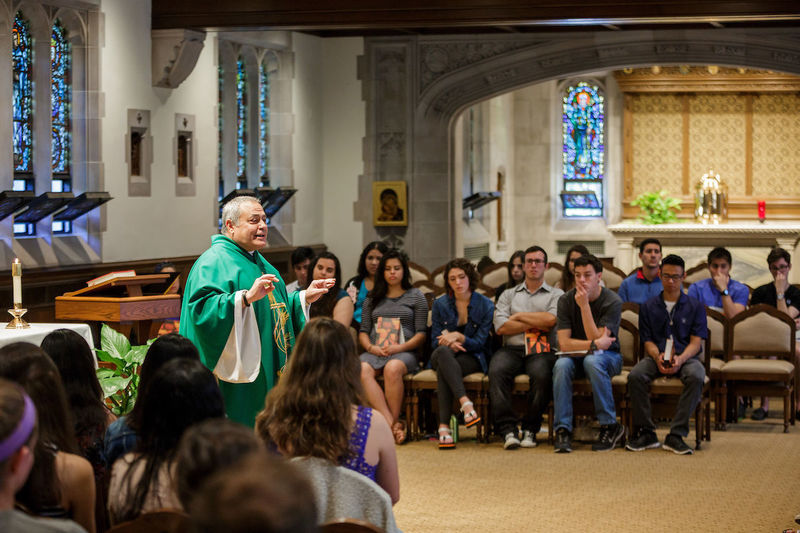
I like the phrase that Pope Francis uses for the unsung heroes all around us. He calls them saints “next door.”
On March 19, 2018, the Solemnity of St. Joseph, Pope Francis published his sixth Apostolic Exhortation, Gaudete et Exsultate (Rejoice and Be Glad): On the Call to Holiness in Today’s World. In his Exhortation, he writes about the saints next door:
“I like to contemplate the holiness present in the patience of God’s people: in those parents who raise their children with immense love, in those men and women who work hard to support their families, in the sick, in elderly religious who never lose their smile. In their daily perseverance I see the holiness of the Church militant. Very often it is a holiness found in our next-door neighbors, those who, living in our midst, reflect God’s presence. We might call them ‘the middle class of holiness.’”
Recently I have had a chance to see just the type of people the Pope praises at work on the Notre Dame campus. These are the men and women working with diligence, devotion and compassion at the University Testing Center for COVID-19.
I had heard a lot about the University Testing Center. At the suggestion of my friend, University vice president and general counsel Marianne Corr ’78, I wrote to Carol Mullaney ’82, senior director of sustainability and logistics, to ask if I could volunteer. She said, “Yes, of course.”
Located at Notre Dame Stadium’s Lou Holtz gate, the testing site is a small world unto itself. Actually, it’s not so small. At the various entrance lines and where the cars pull up, there are greeters everywhere. They welcome you and direct you to right place depending on whether you’re here for symptomatic or surveillance testing or because of contact tracing. They could not be more welcoming. Men and women, kind and caring, smiling and generous, trying to put nervous students, faculty and staff at ease. Saints next door.
There are medical personnel everywhere. They explain what they’re going to do. They answer questions with patience and understanding. After the testing, there is another crew of medical people who provide the results and gently advise what will happen next.
“Well, you tested positive. So you’ll be going to isolation.”
“You were in close contact with someone who tested positive. And though you tested negative from the rapid antigen test, you will be going to quarantine.”
“You just tested negative for the third time. So you’ll be going back to your dorm today.”
Saints next door.
There are ushers everywhere directing people from the testing area to the waiting area, from the waiting area to the hotel reservation area, or to the transportation area, or to the release area. They sanitize seats every time someone moves. These men and women are all “deployed” from the stadium. Each one is proud to tell me how many years they have ushered.
They have all been blessed with the gift of striking up conversations with anyone anywhere. I met a few who I’m sure could strike up a conversation with empty bleachers! They love being around the students. Saints next door.
There are people working behind computers, organizing, entering data, collecting information and more. Since I have an allergy to computers and algorithms, I didn’t talk with them too much. They are diligent and work and work and work. Saints next door.
There are many people working in the transportation area and the hotel area. They are organizing pickups for quarantined students to come to the testing site for another test, or arranging rides to take students from the testing site to the hotels where they’re assigned. Saints next door.
People are delivering three meals to a day to every student in quarantine and isolation. When there were dozens of active cases, there were many deliveries. Saints next door.
Someone makes sure the workers have plenty to eat and drink. Someone orders the food. Someone picks it up. Someone sets it up. Saints next door.
There are organizers and managers and people in charge. The way you know who the managers and organizers are is that they don’t stop moving! They get their 10,000 steps in within two hours of being there. These are the people writing the playbook as they go about answering this question, changing that strategy, doing whatever needs to be done. Saints next door.
I volunteered at the testing site for several days. I loved it. OK, the only thing I didn’t like is that I had to wear closed toe shoes — no flip flops or sandals allowed! Mostly I spoke with students who were waiting for test results. Most were calm; some were anxious.
Mostly I was able to interact with a whole team of saints next door. When this story of Notre Dame’s comeback, please God, is written, it cannot be written without the saints next door at the University Testing Center.
Lord Jesus Christ, Son of the Living God, have mercy on me, a sinner.
Father Joe Corpora works in the Alliance for Catholic Education and Campus Ministry, and is one of 700 priests whom Pope Francis appointed in 2016 to serve as Missionaries of Mercy. He has written two books of reflections on this experience, The Relentless Mercy of God and Being Mercy: The Path to Being Fully Alive, both published by Corby Books. A third book, Doing Mercy: A Path to Contemplation, is scheduled to be published in November.